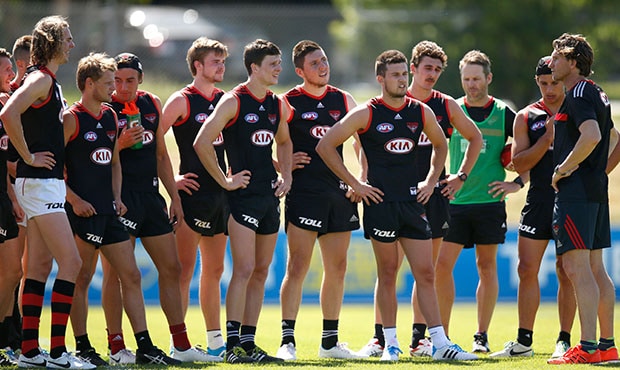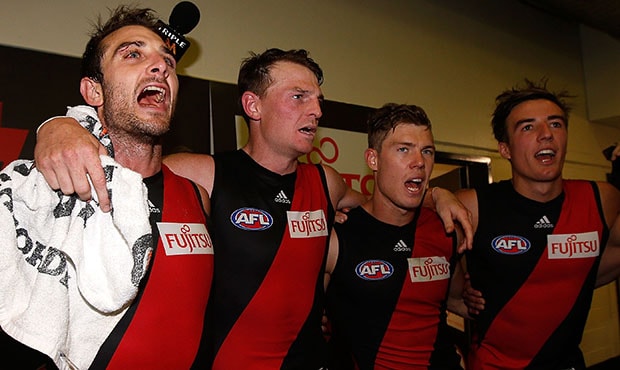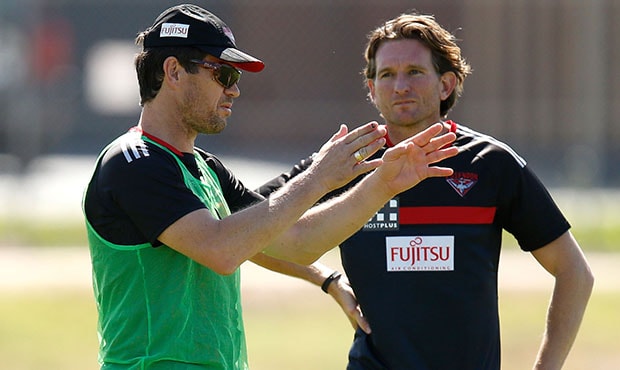WE ARE all-in on this, they said.
If one misses, we’ll all miss, they vehemently blared on their own website on February 11.
But 22 days later, we are to discover it is merely conditional solidarity.
The Essendon Football Club told us that all 2012-listed footballers were not going to play in a NAB Challenge match against St Kilda at Morwell on Saturday March 7.
It was paramount, the Bombers argued, to maintaining anonymity for the 25 or 26 current players among the total of 34 who had received Australian Sports Anti-Doping Authority infraction notices relating to practices in 2012.
It was the "best solution", they said.
"Everyone is mindful that under the anti-doping code there is an obligation to protect the identity of those players that have infraction notices," Rob Kerr, the Bombers' general manager football operations, told his club's website on February 11.
"That is the code the players have signed up to and people may have guesses and the like but the fact is the integrity of the code relies on those players’ identity being protected."
Like so many aspects of Essendon's handling of the ASADA case into drug use at the club in 2012, the pledge lasted only until someone came up with another supposedly better, far improved brainwave.
Events at the club during most of the past two years suggest only two people make decisions at the place - chairman Paul Little and the man no one seems to be able to control, coach James Hird.
From the all-in, fierce pursuit of solidarity of February 11 we now have a situation at Essendon where it is far from one-in, all-in. It's now a one-in, all-in approach with an asterisk against it.
Four players who were listed at Essendon in 2012 will actually play in Morwell. Nick O’Brien, Jackson Merrett, Elliott Kavanagh and Lauchlan Dalgleish are the four.
Others listed in 2012 intend to be involved in a "simulated training" hit-out against a VFL side the evening prior to the game against the Saints. "Simulated training" is code here for "as serious a hit-out as we can possibly have without it being considered a match by the AFL or ASADA".
All in the aim of protecting the players, as Kerr said back on February 11, from any adverse impact on a potential backdated suspension should they be found guilty of use of an ASADA-banned substance by the AFL Anti-Doping Tribunal.
Solidarity. It's all the rage at Essendon on February 11, and out the window by March 5.
Solidarity. It's just a word Essendon chose to shout as it thumped its chest yet again, when it suited it.
Like another word. Truth. Remember that one? Hird told us way back when that when the truth came out, the club would be in a state that bordered heaven.
We've long been aware that we will never, ever, get the whole truth from anyone directly associated with this mess, but we're still waiting on your version of it, James.
Essendon's management of this saga has actually been as questionable as the 2012 actions which remain the subject of the ASADA probe.
Hird and Little have taken on not just the AFL systems but also the courts of the land. They've played the long game, hoping fatigue would wear everyone down. It nearly has, including their own relationship.
The court actions were never anything but sideshows to the main issue. And even after losing – twice – in Federal Court actions involving four judges, Hird wanted us all to know he still felt he had legal right on his side.
"It's been very disappointing what's happened the last two years and the way our football club has been treated and we hope we get the chance to get on and do what we do best and that's play football," Hird said on the day he abandoned his opportunity to take his legal issue to the High Court.
"Fundamentally, we still believe our players weren't treated the way they should have been treated with confidentiality and certain aspects that the average Australian is given."
Don't stop believing, James.
Maybe the decision for the four 2012-listed players to play in Morwell wasn't the first break in Essendon solidarity.
Maybe that happened two weeks earlier when three players, including captain Jobe Watson, who won a Brownlow Medal in the season which was investigated by ASADA, had a private chat with AFL chief executive officer Gillon McLachlan.
It was, we were told, nothing more than a simple get-together arranged by the players in the hope of gaining a better understanding, from McLachlan, of the anti-doping tribunal process.
But Essendon, remember, was aggrieved the last time private chats were attempted between headquarters and club last year, when it is believed McLachlan canvassed the possibilities of brokering an arranged outcome to the ASADA matter, similar to the successful resolution in the NRL's Cronulla case.
McLachlan was right to speak to Little last year but he should not have met with Watson at this stage of this matter. Simply, it is a bad look.
The head of an organisation - which has empowered an anti-doping tribunal, an independent tribunal, to sit in on judgement on the most serious matter ever encountered by that organisation – meeting with a person who has most to lose out of 34 men who have a lot to lose, while that very case is still being deliberated, is highly questionable.
At least McLachlan was smart enough to have the AFL's main legal eagle, Andrew Dillon, sit in on the gathering.
Regardless of outcome at the anti-doping tribunal, which is expected to hand down its findings before the 2015 home and away season starts, the hope is that one day, Hird and Little and others at Essendon will actually "get" what the real issue has always been and will forever be: players under the club's watch were exposed to at-best questionable practices never before seen in VFL/AFL. For a sustained period, with little or no control.
Another hope is that the players themselves, as well as some of those who manage them, realise it too.
Seemingly, everyone who holds a position of power outside the Essendon bubble does. Thankfully, Mick Malthouse and Alastair Clarkson have been prepared to say publicly what dozens of others will only offer in private conversations.
Here's our final hope.
That the people of Morwell who attend Saturday's match reserve a special acknowledgment for four young men - Nick O'Brien, Jackson Merrett, Elliott Kavanagh and Lauchlan Dalgleish.
Whether those four made the decision to play themselves, or whether one of Hird or Little made it for them, does not matter.
In playing in this match, they will have moved on.
Now, there's something that Hird and Little, as well as the Essendon people they've managed to brainwash for two years already, might want to attempt at some stage. Not for themselves, for they clearly don't feel they need to, but for the sake of everyone else in football.


